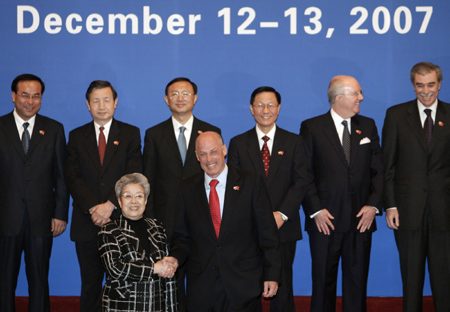Third China-US SED opens in Beijing
Updated: 2007-12-12 10:00
 US Treasury Secretary Henry Paulson shakes hands with Chinese Vice-Premier Wu Yi (L) during the opening of The Third Strategic Economic Dialogue in Xianghe, near Beijing, December 12, 2007. [Agencies] |
Chinese Vice Premier Wu Yi advocated dialogue and consultation as the only way to settle economic and trade disputes at China-US high-level economic talks which opened here Wednesday.
Speaking at the opening ceremony of the bilateral Strategic Economic Dialogue, she recognized that the strong growth of China-US business ties has boosted their cooperation in other fields and has become a foundation for the overall China-US relations.
"History has repeatedly shown it is dialogue and consultation, not confrontation and finger pointing, that has enabled the China-US business relations to grow."
Bilateral trade volume is expected to top $300 billion this year, said Wu, adding that the two countries are each other's second largest trading partners and that China has been the fastest growing export market for the US for five years in a row.
"We should address issues in our business relations in a constructive way," said Wu, who believes that the talks will help boost China-US business ties and constructive and cooperative relations.
The two-day high-level talks will focus on down-to-earth issues from trade integrity, product safety, balanced economic development to energy and environmental cooperation.
"These issues are those of concern to both countries and demonstrate our shared desire to resolve difficulties and problems in the rapid growth of bilateral business ties," she said.
But Wu warned that "We oppose attempts to politicize trade issues", which will harm the interests of both sides.
"I am particularly concerned about the 50 protectionist China-related bills introduced in the US Congress," she said. "I must candidly tell Secretary Paulson that these bills, if adopted, will severely undermine US business ties with China."
Wu appealed the US government, Congress and media to heed the voice of the US business community which claimed in a joint letter to the Congress in September that trade sanctions against China would "only cause a negative impact".
The vice premier also reiterated that China, whose policy is to maintain a basic balance in international payments, has no intention to seek large trade surplus with the US
"I once again call on the US to relax its export control over hi-tech products for civilian use in China," she said. This is in the interest of the US because it will help expand its market share in China, she added.
"Our policy is clear. China's door is wide open to American products and the key is what policy the US should pursue."
Chinese exports in October jumped 22.3 percent to $107.7 billion over the same month last year, pushing its monthly surplus to a record $27 billion.
The allegedly undervalued Chinese currency, the yuan, gives China's exporters an unfair advantage and is a main reason for the massive trade imbalance between China and the US, according to US critics.
Handle issue of food safety in a creative way
Wu Yi said China and the United States should properly address new issues emerging in the course of the growth of bilateral business ties, turn difficulties and challenges into opportunities for cooperation and develop China-US business ties in both depth and width.
China-US business relationship is the most complex one in today's world owing to its huge scale, broad scope and the extensive interests of various parties involved.
"This requires us to view this relationship from a strategic height, demonstrate greater vision and courage, and adopt more effective policy measures to handle in a creative way issues that have occurred as our business ties expand," said the Chinese vice premier.
"We should endeavor to turn difficulties and challenges into opportunities for cooperation, and add new momentum to the growth of our business relations," she added.
Wu took the issue of product quality and food safety as an example, saying that "as economic globalization gathers momentum, product quality and food safety have become a global issue."
This means that the countries concerned must increase cooperation, assume their due responsibilities and strengthen related mechanisms to ensure the quality and safety of people's life, she said.
Before this round of the Dialogue, China and the United States have signed the Memorandum of Agreement on Food and Feed Safety and the Agreement on the Safety of Drugs and Medical Devices.
With regard to China-US trade imbalance, Wu reiterated that China has no intention to seek large trade surplus with the United States, saying that "our policy is to maintain a basic balance in international payments."
Wu said "to address China-US trade imbalance requires the concerted efforts of both sides," and called on the United States to relax export control over export of high-tech products for civilian use to China.
"This is in your own interest. China has been the fastest growing export market for the United States for five years, and there is great potential for increasing US export to China," Wu said.
She said China's policy toward the US import is very clear, and its door is wide open to American products. "The key is what policy the United States should pursue. Whether the United States can increase its export to China hinges on what policy it will follow," she said.
Videos: Interview with US health secretary Q&A
Related Story: US treasury chief warns against protectionism
|
|
|
||
|
||
|
|
|
|